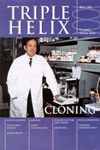Search and destroy?
Preimplantation diagnosis (PGD) and embryo selection for serious genetic disorders will probably become commonplace in Britain now that a two-year public consultation has found widespread support for the practice. Only 20% of respondents believed that the procedure was inherently eugenic and unethical.The technique has been used in Britain since 1990 in five clinics licensed by the Human Fertilisation and Embryology Authority (HFEA) and includes genetic diagnosis (or sex selection for sex-linked conditions) with affected embryos being discarded. PGD is currently used to screen for Duchenne muscular dystrophy, beta-thalassemia, haemophilia, cystic fibrosis and sickle cell anaemia. (Daily Telegraph 2001; 15 November) CMF General Secretary Peter Saunders' personal submission is available on the CMF website at www.cmf.org.uk/ethics/subs/pgd.htm.
Profit first
Drugs are developed according to profitability rather than public health need according to a new report from international medical aid agency Medecin sans Frontieres. MSF asked 11 leading pharmaceutical companies about overall resources devoted to malaria, tuberculosis, sleeping sickness, leishmaniasis and Chaga's disease and found that seven spent less than 1% of their research and development budget on any of the five diseases. (BMJ 2001; 323:827, 13 October; www.accessmed-msf.org)
Healthy faith
Christian faith protects against suicide and alcoholism according to a review in the British Medical Journal. A Northern Ireland Suicide Study has confirmed that religious commitment is inversely related to suicide risk; and a North Carolina study has shown that recent alcohol disorders are 42% less common among those who frequently read the Bible or pray privately. (BMJ 2001;323:817-8, 13 October)
Gold robbery
Christ's values have been so absorbed by civilised nations that we often take them for granted and many contemporary ethicists steal their best ideas from the Judeo-Christian tradition, without acknowledging the true source. In a recent example Stephen Pattison, the head of the Cardiff University Department of Religious and Theological Studies, attributes the golden rule to ethicist Peter Singer! (BMJ 2001;323:840, 13 October) Christ's golden rule, that we should treat others as we would want them to treat us, was unique to him. (Matthew 7:12)
Pacific organ trade
An unsolicited letter from Germany to a clinic in Tokyo challenges the belief that organ sales are just an urban myth. It reads: 'We are selling people of good health for 10,000 US Dollar. Organs including heart, lung, kidney and spleen among others. We bring these people from Europe, Fiji, Papua New Guinea, Macao, Virgin Is, French Polynesia, Kiribati, Nauru, Vanuatu, New Caledonia, Samoa, Tonga, Micronesia and Solomon Is.' (BMJ 2001;323:1196, 17 November)
Welcome ruling on drug patents
Developing countries facing serious crises in public health such as HIV/AIDS will benefit from a World Trade Organisation declaration relaxing drug patents. The commitment made at the WTO meeting in Doha, Qatar will enable poorer nations to seek a waiver from the organisation's strict rules - known as trade related aspects of intellectual property rights (TRIPS) - which guarantee patents for 20 years. (BMJ 2001;323:1146, 17 November)
Assisted suicide turnaround
In a landmark ruling, US Attorney General John Ashcroft has authorised the Drug Enforcement Administration to take action against doctors prescribing lethal drugs to terminally ill patients. The judgement reversed the previous position of the Clinton administration. Ashcroft said that assisted suicide is not 'a legitimate medical purpose' for prescribing. The decision effectively overturns Oregon's Death with Dignity Act (1997) under which mentally competent patients who are terminally ill have been able to take lethal drugs if doctors agree that they have less than six months to live. (BMJ 2001;323:1149, 17 November)
Ireland approves 'morning after' pill
The Irish Medicine Board has approved the 'emergency contraception' pill for the first time. The board had previously refused a licence for levonorgestrel on the grounds that it was an abortifacient. Although the Family Planning Association's promotional literature says that 'emergency pills have not been shown to affect a pregnancy or harm a developing baby' it is well known that one of the main mechanisms of action of the pill is to prevent blastocyst implantation. (BMJ 2001;323:1204, 24 November)
Ethicists come out for euthanasia
Two leading British ethicists, the former a member of the British Medical Association's Central Ethics Committee, have argued that euthanasia and physician assisted suicide should be legalised. Len Doyal and Lesley Doyal, from Bart's and Bristol respectively, say in a British Medical Journal editorial that 'if death is in the best interest of some patients...then death constitutes a moral good for these patients. And if this is so then why is it wrong to intend to bring about this moral good?' (BMJ 2001;323:1079-80). Dr Leo Alexander, a psychiatrist who worked with the Office of the Chief of Counsel for War Crimes at Nuremberg, described a similar strand of thinking in 1949: 'The beginnings at first were merely a subtle shift in emphasis in the basic attitude of the physicians. It started with the attitude, basic in the euthanasia movement that there is such a thing as a life not worthy to be lived. This attitude in its early stages concerned itself merely with the severely and chronically sick. Gradually the sphere of those to be included in this category was enlarged...'. (NEJM 1949;241(2):39-47) The War Crimes Tribunal concluded in 1948 that, 'our regretful but inevitable judgement must be that the responsibility for the (holocaust) rests in large measure upon the bulk of the medical profession; because the profession without vigorous protest, permitted itself to be ruled by such men.'
(www.cmf.org.uk/journal/jul92/thou.htm)































